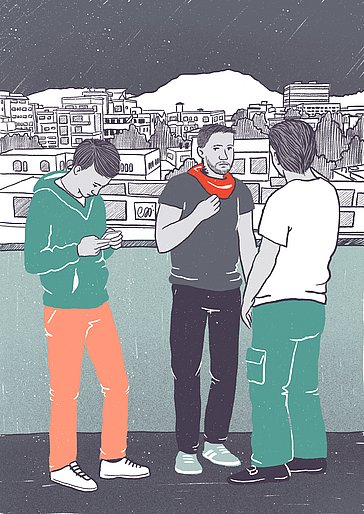
AFGHANISTAN
The destination is more distant than ever
Nuri Zhowandai, Samir Rahmani, Ahmed Kohzad: Afghanistan - Germany - Afghanistan - ?
Many returnees drop by Abdul Ghafoors’ office after landing in Kabul. He runs the Afghanistan Migrants Advice and Support Organization (AMASO), an independent counselling centre for returnees. Nuri Zhowandai, Samir Rahmani and Ahmed Kohzad* have often gone there several times to talk about how they can carry on. Today they have come to tell their story and how they ended up back in Afghanistan.
Note: The meeting with Nuri Zhowandai, Samir Rahmani, Ahmed Kohzad* took place in spring 2021, before the Taliban invasion. Abdul Ghafoor managed to leave the country in August 2021, colleagues and friends continue to stay in Kabul, the counseling center no longer exists. (August 2021)
The wrong step
Samir is the first to recount his tale. He said that he signed his consent to return because his mother was very ill and wanted to have him around. Nuri and Ahmed returned because they had exhausted all legal possibilities in Germany to obtain legal residence status there; they had taken legal action against their rejection and lost. Today, all three agree that they made the wrong decision. Samir returned in 2016. Back in Germany, he says, he was not aware of how much the security situation in Afghanistan had deteriorated. “There are explosions every day and targeted killings are taking place. If I had known all this, I would have done everything I could to stay in Germany or go to another European country. There is no way I would have signed the agreement to return.” Samir can do little with what he learned from his training in Germany in Kabul. In Germany, he worked in a garage that repairs luxury cars: “The cars here in Afghanistan are too old, I don’t know anything about them. I have no chance of being taken on in a workshop here.” The others also say that in Germany they mainly worked with modern machinery. Here, however, many things are simply repaired by hand. Ahmed, who only returned in February 2021, learned a lot about electronic music in Germany and worked there as a DJ. This makes life in Afghanistan even more dangerous for him. All three are trying to get a foothold and find a job despite adverse circumstances. Ahmed describes how he searches for work every day. Samir adds: there is simply not enough paid work; half the country is starving.
Nuri has no family in Afghanistan - they are all living in Iran. His only hope is to make it there. He has been trying in vain to find work in Kabul for too long. Ahmed is also alone in Kabul. If he went to his family in the remote province of Ghazni with empty pockets, he is sure they would turn him away. Moreover, even the tattoo on the back of his neck can put him in danger in the province. Things are different for Samir, who returned because of his sick mother. A year after his arrival, she passed away. Now he has to assume responsibility for his siblings and help his aged father.
Support? Not much
None of these three persons received any psychosocial support after their return. Ad Abdul puts it: “While several organisations have staff at the airport to support people who are forcibly deported to Afghanistan, there is often no one there to support ‘voluntary’ returnees.” They had not been told that the International Psychosocial Organisation (IPSO) cooperates with German reintegration programmes and offers psychosocial counselling on the ground. Apart from AMASO, they have not received any real support in Afghanistan. At his first counselling session with Abdul, Nuri was told about the International Organisation for Migration (IOM). But the deadline to apply for financial support had already expired. Ahmed received support from AWARD, an organisation funded by the GIZ, with assistance in kind to furnish his flat. But only a week later, he was forced to sell everything again far below value because he urgently needed money for food. Abdul explains: “No organisation except IOM gives cash to voluntary returnees; instead they receive support in kind.” Support in kind is complicated and, according to Ahmed, not enough to solve the most basic existential problems.
Would the three of them like to leave Afghanistan again? Samir says he would leave immediately if he could, but he lacks the means. He is working in a print shop at present. His earnings there are not even enough to put enough food on the table for his siblings, let alone pay the expenses involved in leaving the country. Ahmed is looking for ways to get to Iran. There he could look around and see what is possible and then decide whether he should stay in Iran or go back to Europe. Nuri is also preparing to go to Iran to see his family, but he may want to travel on from there to Turkey or Europe. All three regret returning to Afghanistan. In search of security and a livelihood, their destination is more distant than ever.
* The names have been changed by the editors.
